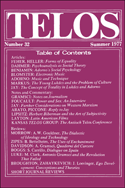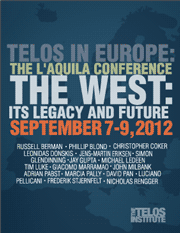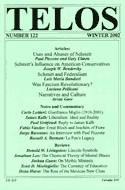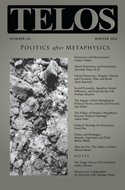By J. F. Dorahy · Tuesday, March 5, 2013 As an occasional feature on TELOSscope, we highlight a past Telos article whose critical insights continue to illuminate our thinking and challenge our assumptions. Today, J.F. Dorahy looks at György Márkus’s “The Soul and Life: The Young Lukács and the Problem of Culture,” from Telos 32 (Summer 1977).
 György Márkus’s essay on Lukács, “The Soul and Life,” is a seminal insight into one of the most influential philosophical oeuvres of the twentieth century. This piece, published at a time when only a handful of Márkus’s papers were available to English-language readers, reflects an intimacy with Lukács’s aesthetics that is unsurpassed in Lukács scholarship. (Márkus jointly edited, along with Frank Benesler, Lukács’s posthumously published Heidelberger Philosophie der Kunst 1916–18 and the Heidelberger Ästhetik 1916–1918, works that figure prominently in the essay under consideration.) The discussion in “The Soul and Life” centers on the problem of the possibility of culture as treated by Lukács in his pre-1918, or pre-Marxist, writings. György Márkus’s essay on Lukács, “The Soul and Life,” is a seminal insight into one of the most influential philosophical oeuvres of the twentieth century. This piece, published at a time when only a handful of Márkus’s papers were available to English-language readers, reflects an intimacy with Lukács’s aesthetics that is unsurpassed in Lukács scholarship. (Márkus jointly edited, along with Frank Benesler, Lukács’s posthumously published Heidelberger Philosophie der Kunst 1916–18 and the Heidelberger Ästhetik 1916–1918, works that figure prominently in the essay under consideration.) The discussion in “The Soul and Life” centers on the problem of the possibility of culture as treated by Lukács in his pre-1918, or pre-Marxist, writings.
Continue reading →
By Marcia Pally · Friday, March 1, 2013 The following paper was presented at the Seventh Annual Telos Conference, held on February 15–17, 2013, in New York City.
 I’d like to begin with the idea that religion is not only useful for social service provision and various charities but that it has ideas that might be valuable, among them theologies of relationality. These are theologies that take the actions of relationship—not positions like parent/child, sovereign/subject, etc. but verbs—as their core. They, I’ll argue, offer a conceptual framework for addressing a long-running problem at least in the modern developed world. That problem is the ostensible binary choice between situatedness and separability and the unhappy results when we slip too far to one side or the other. Theologies of relationality may offer even non-believers a notion of the kinds of ideas needed to keep us from this self-induced harm. I’d like to begin with the idea that religion is not only useful for social service provision and various charities but that it has ideas that might be valuable, among them theologies of relationality. These are theologies that take the actions of relationship—not positions like parent/child, sovereign/subject, etc. but verbs—as their core. They, I’ll argue, offer a conceptual framework for addressing a long-running problem at least in the modern developed world. That problem is the ostensible binary choice between situatedness and separability and the unhappy results when we slip too far to one side or the other. Theologies of relationality may offer even non-believers a notion of the kinds of ideas needed to keep us from this self-induced harm.
Continue reading →
By Julio Alcántara · Wednesday, February 27, 2013 The following paper was presented at Telos in Europe: The L’Aquila Conference, held on September 7-9, 2012, in L’Aquila, Italy.
 When we ask, once again, about the sense and origin of the West, we are led to a spatial relation of meaning that humans have with the world and with themselves. The essence of this act is based on the fundamental values of this era, which define the borderlines of the present’s symbolic extension: the human being, as a spatial-being, is also temporal. In fact, spatial differences are not more that multiple fields of temporal states of being. In short, what brings us together today is the polemic signification of the space-time limit of the occidental man and, as such, of the factual possibility of being in the world. When we ask, once again, about the sense and origin of the West, we are led to a spatial relation of meaning that humans have with the world and with themselves. The essence of this act is based on the fundamental values of this era, which define the borderlines of the present’s symbolic extension: the human being, as a spatial-being, is also temporal. In fact, spatial differences are not more that multiple fields of temporal states of being. In short, what brings us together today is the polemic signification of the space-time limit of the occidental man and, as such, of the factual possibility of being in the world.
Continue reading →
By Maja Sidzinska · Tuesday, February 26, 2013 As an occasional feature on TELOSscope, we highlight a past Telos article whose critical insights continue to illuminate our thinking and challenge our assumptions. Today, Maja Sidzinska looks at James Kalb’s “Liberalism: Ideal and Reality,” from Telos 122 (Winter 2002).
 James Kalb bluntly asks us: “Why does liberalism—the tradition that makes equal freedom the political touchstone—combine such strength with such incoherence? . . . Liberalism is triumphant almost everywhere, but its victory reverses the meaning of its principles. It calls for live-and-let-live, and enforces it by supervising everything” (111). Kalb explores the inherent tension between what he regards as the two core principles of liberalism—freedom and equality. Here, freedom is interpreted as the potential or ability to carry out one’s will, while equality is understood as the principle that ensures the right of each individual to do so. But what happens when two individuals’ wills are in conflict? Logically, liberalism has few intrinsic means to resolve such a scenario, argues Kalb. It simply “resolves disputes by letting each do as he likes consistent with the equal freedom of others, and in case of conflict the more tolerant wins” (117). In this case, “more tolerant” appears to refer to that stance which is less intrusive on the will, person, or property of another. James Kalb bluntly asks us: “Why does liberalism—the tradition that makes equal freedom the political touchstone—combine such strength with such incoherence? . . . Liberalism is triumphant almost everywhere, but its victory reverses the meaning of its principles. It calls for live-and-let-live, and enforces it by supervising everything” (111). Kalb explores the inherent tension between what he regards as the two core principles of liberalism—freedom and equality. Here, freedom is interpreted as the potential or ability to carry out one’s will, while equality is understood as the principle that ensures the right of each individual to do so. But what happens when two individuals’ wills are in conflict? Logically, liberalism has few intrinsic means to resolve such a scenario, argues Kalb. It simply “resolves disputes by letting each do as he likes consistent with the equal freedom of others, and in case of conflict the more tolerant wins” (117). In this case, “more tolerant” appears to refer to that stance which is less intrusive on the will, person, or property of another.
Continue reading →
By Telos Press · Monday, February 25, 2013 Telos has always been about big ideas. Populism. Federalism. Traditions. The intersection of politics and religion. The legacy of totalitarianism and the ongoing threat of terrorism. Over the years we’ve dedicated special issues to these and other topics in order to give them the wider critical attention they deserve.
In the spirit of big ideas, we’re offering a 20% discount on select special issues of Telos from today through the end of March. There’s no better time than now to explore our rich history of critical engagement with the pivotal concerns of politics and philosophy.
Browse the back issues of Telos here. Note: Articles from out-of-stock special issues are available in digital form at the Telos Online website.
Continue reading →
By Michael Marder · Wednesday, February 13, 2013 Michael Marder’s “After the Fire: The Politics of Ashes” appears in Telos 161 (Winter 2012). Read the full version online at the Telos Online website, or purchase a print copy of the issue in our store.
 Two fires are kindled at the threshold of the metaphysical era, and both are extinguished, almost simultaneously, as soon as metaphysics exhausts itself (or else gets exhausted, tired, fatigued with itself) in its final Nietzschean inversion. The political reality of the twenty-first century is, as a whole, a comet tail of these ancient blazes that, until recently, seemed to be older than time itself, gave the impression of being eternal, undying, inextinguishable. How to find one’s bearings among the cinders and ashes of what the flames consumed? How to make sense—if make sense we must—of the burnt and smoldering remains, the traces of catastrophes, as much as of hopes and revolutionary desires, littering the horizons of the political today? Two fires are kindled at the threshold of the metaphysical era, and both are extinguished, almost simultaneously, as soon as metaphysics exhausts itself (or else gets exhausted, tired, fatigued with itself) in its final Nietzschean inversion. The political reality of the twenty-first century is, as a whole, a comet tail of these ancient blazes that, until recently, seemed to be older than time itself, gave the impression of being eternal, undying, inextinguishable. How to find one’s bearings among the cinders and ashes of what the flames consumed? How to make sense—if make sense we must—of the burnt and smoldering remains, the traces of catastrophes, as much as of hopes and revolutionary desires, littering the horizons of the political today?
Continue reading →
|
|
 György Márkus’s essay on Lukács, “The Soul and Life,” is a seminal insight into one of the most influential philosophical oeuvres of the twentieth century. This piece, published at a time when only a handful of Márkus’s papers were available to English-language readers, reflects an intimacy with Lukács’s aesthetics that is unsurpassed in Lukács scholarship. (Márkus jointly edited, along with Frank Benesler, Lukács’s posthumously published Heidelberger Philosophie der Kunst 1916–18 and the Heidelberger Ästhetik 1916–1918, works that figure prominently in the essay under consideration.) The discussion in “The Soul and Life” centers on the problem of the possibility of culture as treated by Lukács in his pre-1918, or pre-Marxist, writings.
György Márkus’s essay on Lukács, “The Soul and Life,” is a seminal insight into one of the most influential philosophical oeuvres of the twentieth century. This piece, published at a time when only a handful of Márkus’s papers were available to English-language readers, reflects an intimacy with Lukács’s aesthetics that is unsurpassed in Lukács scholarship. (Márkus jointly edited, along with Frank Benesler, Lukács’s posthumously published Heidelberger Philosophie der Kunst 1916–18 and the Heidelberger Ästhetik 1916–1918, works that figure prominently in the essay under consideration.) The discussion in “The Soul and Life” centers on the problem of the possibility of culture as treated by Lukács in his pre-1918, or pre-Marxist, writings.  I’d like to begin with the idea that religion is not only useful for social service provision and various charities but that it has ideas that might be valuable, among them theologies of relationality. These are theologies that take the actions of relationship—not positions like parent/child, sovereign/subject, etc. but verbs—as their core. They, I’ll argue, offer a conceptual framework for addressing a long-running problem at least in the modern developed world. That problem is the ostensible binary choice between situatedness and separability and the unhappy results when we slip too far to one side or the other. Theologies of relationality may offer even non-believers a notion of the kinds of ideas needed to keep us from this self-induced harm.
I’d like to begin with the idea that religion is not only useful for social service provision and various charities but that it has ideas that might be valuable, among them theologies of relationality. These are theologies that take the actions of relationship—not positions like parent/child, sovereign/subject, etc. but verbs—as their core. They, I’ll argue, offer a conceptual framework for addressing a long-running problem at least in the modern developed world. That problem is the ostensible binary choice between situatedness and separability and the unhappy results when we slip too far to one side or the other. Theologies of relationality may offer even non-believers a notion of the kinds of ideas needed to keep us from this self-induced harm.  When we ask, once again, about the sense and origin of the West, we are led to a spatial relation of meaning that humans have with the world and with themselves. The essence of this act is based on the fundamental values of this era, which define the borderlines of the present’s symbolic extension: the human being, as a spatial-being, is also temporal. In fact, spatial differences are not more that multiple fields of temporal states of being. In short, what brings us together today is the polemic signification of the space-time limit of the occidental man and, as such, of the factual possibility of being in the world.
When we ask, once again, about the sense and origin of the West, we are led to a spatial relation of meaning that humans have with the world and with themselves. The essence of this act is based on the fundamental values of this era, which define the borderlines of the present’s symbolic extension: the human being, as a spatial-being, is also temporal. In fact, spatial differences are not more that multiple fields of temporal states of being. In short, what brings us together today is the polemic signification of the space-time limit of the occidental man and, as such, of the factual possibility of being in the world.  James Kalb bluntly asks us: “Why does liberalism—the tradition that makes equal freedom the political touchstone—combine such strength with such incoherence? . . . Liberalism is triumphant almost everywhere, but its victory reverses the meaning of its principles. It calls for live-and-let-live, and enforces it by supervising everything” (111). Kalb explores the inherent tension between what he regards as the two core principles of liberalism—freedom and equality. Here, freedom is interpreted as the potential or ability to carry out one’s will, while equality is understood as the principle that ensures the right of each individual to do so. But what happens when two individuals’ wills are in conflict? Logically, liberalism has few intrinsic means to resolve such a scenario, argues Kalb. It simply “resolves disputes by letting each do as he likes consistent with the equal freedom of others, and in case of conflict the more tolerant wins” (117). In this case, “more tolerant” appears to refer to that stance which is less intrusive on the will, person, or property of another.
James Kalb bluntly asks us: “Why does liberalism—the tradition that makes equal freedom the political touchstone—combine such strength with such incoherence? . . . Liberalism is triumphant almost everywhere, but its victory reverses the meaning of its principles. It calls for live-and-let-live, and enforces it by supervising everything” (111). Kalb explores the inherent tension between what he regards as the two core principles of liberalism—freedom and equality. Here, freedom is interpreted as the potential or ability to carry out one’s will, while equality is understood as the principle that ensures the right of each individual to do so. But what happens when two individuals’ wills are in conflict? Logically, liberalism has few intrinsic means to resolve such a scenario, argues Kalb. It simply “resolves disputes by letting each do as he likes consistent with the equal freedom of others, and in case of conflict the more tolerant wins” (117). In this case, “more tolerant” appears to refer to that stance which is less intrusive on the will, person, or property of another.  Two fires are kindled at the threshold of the metaphysical era, and both are extinguished, almost simultaneously, as soon as metaphysics exhausts itself (or else gets exhausted, tired, fatigued with itself) in its final Nietzschean inversion. The political reality of the twenty-first century is, as a whole, a comet tail of these ancient blazes that, until recently, seemed to be older than time itself, gave the impression of being eternal, undying, inextinguishable. How to find one’s bearings among the cinders and ashes of what the flames consumed? How to make sense—if make sense we must—of the burnt and smoldering remains, the traces of catastrophes, as much as of hopes and revolutionary desires, littering the horizons of the political today?
Two fires are kindled at the threshold of the metaphysical era, and both are extinguished, almost simultaneously, as soon as metaphysics exhausts itself (or else gets exhausted, tired, fatigued with itself) in its final Nietzschean inversion. The political reality of the twenty-first century is, as a whole, a comet tail of these ancient blazes that, until recently, seemed to be older than time itself, gave the impression of being eternal, undying, inextinguishable. How to find one’s bearings among the cinders and ashes of what the flames consumed? How to make sense—if make sense we must—of the burnt and smoldering remains, the traces of catastrophes, as much as of hopes and revolutionary desires, littering the horizons of the political today? 

